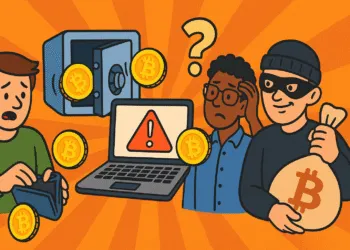If you’re holding Bitcoin — or thinking about it — there’s one piece of knowledge that separates casual users from true owners: understanding private keys.
A private key is more than just a line of code. It’s the gatekeeper to your Bitcoin. Lose it, and your coins are gone. Share it, and someone else might steal them. Yet even in 2025, many users still overlook the basics.
Here are six essential things every Bitcoin user should know about private keys.
1. A Private Key Is Your Bitcoin
When you buy Bitcoin, you’re not holding digital coins. You’re holding the ability to spend them, and that power lies entirely in your private key.
A private key is a long, randomly generated alphanumeric string that allows you to sign transactions and prove ownership of your BTC. Without it, you can’t move your Bitcoin — ever. This is what people mean when they say, “Not your keys, not your coins.”
2. Private Keys and Public Addresses Work Together
Your private key creates your public key, which in turn is hashed to generate your Bitcoin address — the one you share to receive funds.
Think of it like this:
- The private key is your password.
- The public address is your email.
- You can give out your email, but never your password.
When someone sends Bitcoin to your address, only your private key can unlock and spend it. This is the cryptographic backbone of Bitcoin’s security.
3. If You Lose Your Private Key, Your Bitcoin Is Gone Forever
There’s no “forgot password” button. No support line. If your private key is lost, so is your Bitcoin — permanently. This isn’t just theory; millions of BTC are estimated to be lost due to forgotten keys or misplaced wallets.
Whether you’re storing keys on a hardware wallet, encrypted USB, or even a piece of paper, backup is non-negotiable. But backup doesn’t mean taking a screenshot or uploading it to Google Drive. That brings us to the next point…
4. Most People Store Their Keys Wrong
Too many users get comfortable. Here are just a few common mistakes:
- Saving private keys in plaintext on cloud services
- Taking photos or screenshots of wallets
- Leaving keys unencrypted on desktop files
- Trusting random apps or “free” online wallets
These habits can expose your funds to phishing attacks, malware, or outright theft. Even in 2025, rug pulls and wallet drainers are still happening — often due to poor key management.
5. Cold Storage Is Still King
If you’re serious about long-term Bitcoin security, cold storage remains the gold standard. This includes:
- Hardware wallets (like Ledger or Trezor), where keys stay offline
- Paper wallets, stored in secure locations
- Multi-signature wallets, which require multiple approvals to move funds
And don’t forget: your recovery seed — typically a 12 or 24-word phrase — is essentially your private key in disguise. Treat it with the same level of caution. If someone gets your seed, they get your Bitcoin.
6. The Future Might Be Keyless — But We’re Not There Yet
Emerging solutions like social recovery wallets, MPC (multi-party computation), and smart contract-based key management are making waves. The goal is to reduce the burden of self-custody without compromising security.
Still, these are new technologies — and many remain experimental. For now, understanding and protecting your private key is still the most reliable way to control your crypto.
Final Thoughts: Ownership Comes with Responsibility
Bitcoin gives you freedom. But with that freedom comes full accountability. Managing your private keys isn’t just a technical detail — it’s the very core of Bitcoin self-custody.
Take the time to learn, set up secure storage, and revisit your security practices regularly. Because in Bitcoin, the difference between wealth and loss is often a single forgotten key.
What to Read Next:
- What Happens If You Lose Access to Your Wallet? (And How to Prevent It)
- How to Keep Your Crypto Safe in 2025 – Security Best Practices

















